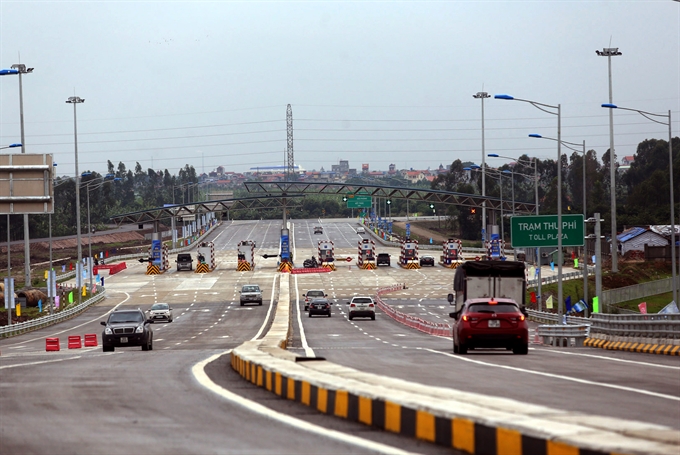 Society
Society

Calculating the cost and choosing the investors and contractors for BOT projects must be transparent, Deputy Prime Minister Trịnh Đình Dũng said yesterday.
 |
| A toll booth on the Hà Nội-Hải Phòng expressway. The public has expressed concern over the shortcomings of road projects under BOT and BT contracts, such as high tolls and unplanned toll stations on national highways. — VNA/VNS Photo Huy Hùng |
HÀ NỘI — Calculating the cost and choosing the investors and contractors for BOT projects must be transparent, Deputy Prime Minister Trịnh Đình Dũng said yesterday.
Speaking at a meeting to review transport investment in the form of build-operate-transfer (BOT) and build-transfer (BT), the deputy PM said that “defining exactly the cost of BOT and BT projects will have the support of the people.”
The deputy PM also said the public had recently expressed concern over the shortcomings of BOT and BT projects, such as high tolls and unplanned toll stations on national highways.
Transport Minister Trương Quang Nghĩa reported at the meeting that between 2011 and 2015, VNĐ186 trillion (US$8.33 billion) was mobilized in private investment, accounting for 42 per cent of total investment in 62 BOT and BT transport infrastructure projects.
So far, 26 projects with a total investment of VNĐ74.8 trillion (US$3.35 billion) have been put into operation and another 36 with an investment of VNĐ111.8 trillion ($5 billion) have been completed, Nghĩa told the meeting.
“The operation of infastructure transport projects has brought meaningful economic value, meeting the increasing transport demand, contributing to reduction of traffic congestion and accidents as well as promoting regional economic delopment," said the minister.
According to the minister, the World Economic Forum (WEF) ranked the efficiency and quality of Việt Nam’s transportation infrastructure in 2014 in 74th place among 138 countries, compared to 90 in 2012 and 103 in 2010.
Many who spoke at the meeting said that invesmnent in transport infrastructure projects in the form of Public-Private Partnerships (PPP) was more complicated than traditional investment forms, requiring that all three sides benefit - State, investors and road users.
According to the ministry, one of the biggest concerns of BOT and BT projects was the quality of the works, which is the responsibility of the investors and projectors. Recently, several projects have been found to be of poor quality once they were put into operation.
The ministry has penalised investors on those projects by halting their fees or asked them to pay themselves to fix their construction mistakes.
Such was the case with the National Highway 1 in Vinh City of Central Nghệ An Province and Hà Tĩnh City.
The Ministry of Transport explained to participants of the meeting that the current rate of tolls was in compliance with that set by the Ministry of Finance.
The ministries of Finance and Transport have proposed an increase in tolls but they will seek opinions from other ministries and localities.
At present, there are 88 toll tax stations on national highways, 74 of which are managed by the Transport Ministry and the rest under the control of local People’s Committees.
Trần Đình Thiên, director of the Việt Nam Economic Institute, said: the cost of BOT projects in Việt Nam was higher than in other countries, resulting in higher tolls and public dissatisfaction.
Thiên suggested that the State should help investors by allowing them to collect tolls for a longer period so as to reduce toll rates.
Nguyễn Ngọc Bảo, vice head of the Central Economic Committee, told the meeting that the State management in the field has exposed some shortcomings, such as lack of a master plan for BOT projects for specific region.
Deputy Minister of Transport Nguyễn Nhật said the State Budget has met 11 per cent of the demand and thus the PPP investment model was a necessary solution.
However, its implementation faces many hurdles, such as lack of a legal framework, long-term domestic credit and policies for access to foreign capital.
The Transport Minister suggested that the Government carry out some PPP transport infrastructure projects on a trial basis to help formulate policies and mechanism for this investment model. -- VNS




